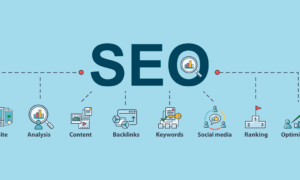The rise of e-commerce has transformed how businesses operate and consumers shop. With countless online marketplaces competing for attention, standing out is essential. Search Engine Optimization (SEO) has emerged as a critical strategy to enhance visibility and attract potential buyers. This article explores how leveraging SEO can significantly boost the presence of e-commerce marketplaces.
Understanding SEO in E-commerce
What is SEO?
SEO is the practice of optimizing a website to rank higher in search engine results pages (SERPs). Higher rankings typically lead to increased traffic, which can translate into more sales. SEO involves various techniques, including keyword optimization, content creation, link building, and technical improvements.
Importance of SEO for E-commerce Marketplaces
In e-commerce, visibility is everything. Most consumers use search engines like Google to find products. If your marketplace isn’t appearing in top search results, you’re likely missing out on potential customers. Effective SEO ensures that your marketplace is easily discoverable by search engines, leading to increased traffic and, ultimately, higher sales.
Keyword Research and Optimization
Identifying Relevant Keywords
Keywords are the terms and phrases that users type into search engines. Identifying the right keywords is the foundation of a successful SEO strategy. Tools like Google Keyword Planner, Ahrefs, and SEMrush can help identify relevant keywords with high search volumes and low competition.
On-Page SEO Techniques
On-page SEO involves optimizing individual pages on your website. This includes incorporating targeted keywords into titles, meta descriptions, headers, and content. Ensure that your product descriptions are detailed and include relevant keywords naturally. Avoid keyword stuffing, as it can lead to penalties from search engines.
Product Descriptions and Reviews
Detailed product descriptions that include relevant keywords can significantly improve your SEO. Encourage customers to leave reviews, as user-generated content is valued by search engines and can enhance your marketplace’s credibility and visibility.
Technical SEO for E-commerce Marketplaces
Site Structure and Navigation
A well-structured site is essential for both user experience and SEO. Ensure that your website is easy to navigate, with a logical hierarchy of categories and subcategories. Use breadcrumb navigation to help users and search engines understand the structure of your site.
Mobile Optimization
With the increasing use of mobile devices, having a mobile-friendly website is crucial. Google uses mobile-first indexing, meaning it primarily uses the mobile version of a site for ranking and indexing. Ensure that your marketplace is responsive and provides a seamless experience across all devices.
Page Speed and Performance
Page speed is a critical factor in SEO. Slow-loading pages can lead to high bounce rates, negatively impacting your rankings. Optimize images, leverage browser caching, and use content delivery networks (CDNs) to improve your site’s performance.
Secure and Accessible Website
Having a secure website (HTTPS) is essential for SEO. Google prioritizes secure sites in its rankings. Ensure that your website is accessible to all users, including those with disabilities. Use alt text for images and maintain a clear and readable layout.
Content Marketing and Link Building
Blogging and Content Creation
Creating valuable content is a powerful way to attract traffic to your marketplace. Start a blog and publish articles related to your products and industry. This not only drives traffic but also establishes your marketplace as an authority in your niche.
Guest Blogging and Collaborations
Collaborate with influencers and other websites to expand your reach. Guest blogging allows you to tap into established audiences and build high-quality backlinks, which are crucial for SEO. Ensure that your content is relevant and provides value to the readers.
Social Media Integration
Social media can play a significant role in your SEO strategy. Share your content on social media platforms to drive traffic and engagement. Social signals, such as likes, shares, and comments, can indirectly influence your search engine rankings.
Monitoring and Analyzing SEO Performance
Using Analytics Tools
Regularly monitor your SEO performance using tools like Google Analytics and Google Search Console. These tools provide insights into your traffic sources, user behavior, and overall performance. Identify which strategies are working and which need improvement.
Adjusting Your SEO Strategy
SEO is not a one-time effort; it requires continuous optimization. Based on your analytics, adjust your strategy to improve performance. Stay updated with the latest SEO trends and algorithm changes to ensure your marketplace remains competitive.
Advanced SEO Techniques for E-commerce Marketplaces
Structured Data and Rich Snippets
Structured data helps search engines understand the content of your site. Implementing schema markup can enhance your search results with rich snippets, such as product ratings and prices. Rich snippets can improve your click-through rates and visibility in SERPs.
Voice Search Optimization
With the rise of voice-activated devices, optimizing for voice search is becoming increasingly important. Voice search queries are often longer and conversational. Focus on natural language and long-tail keywords to capture voice search traffic.
Local SEO
If your marketplace caters to a specific geographic area, local SEO can be highly beneficial. Optimize your site for local searches by including your location in keywords, creating local content, and getting listed in local directories and Google My Business.
Common SEO Mistakes to Avoid
Ignoring Mobile Users
As mentioned earlier, mobile optimization is crucial. Neglecting mobile users can significantly impact your SEO and user experience. Ensure that your site is fully responsive and offers a seamless experience on all devices.
Duplicate Content
Duplicate content can harm your SEO efforts. Avoid copying product descriptions from manufacturers and ensure that all content on your site is unique. Use canonical tags to indicate the preferred version of a page to search engines.
Neglecting Technical SEO
Technical SEO is the backbone of your strategy. Neglecting aspects like site speed, security, and structured data can hinder your SEO performance. Regularly audit your site to identify and fix technical issues.
Conclusion
Leveraging SEO is essential for e-commerce marketplaces aiming to increase visibility and attract more customers. By implementing effective keyword strategies, optimizing on-page and technical elements, creating valuable content, and continuously monitoring performance, your marketplace can achieve higher rankings and drive more traffic. Stay updated with SEO trends and best practices to maintain a competitive edge in the ever-evolving digital landscape.



































